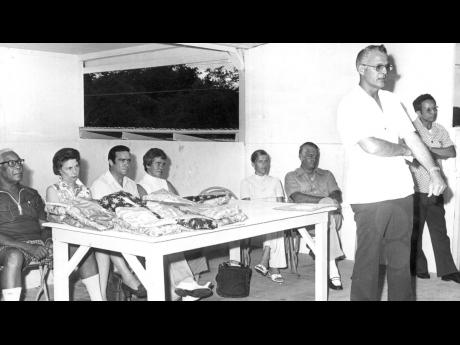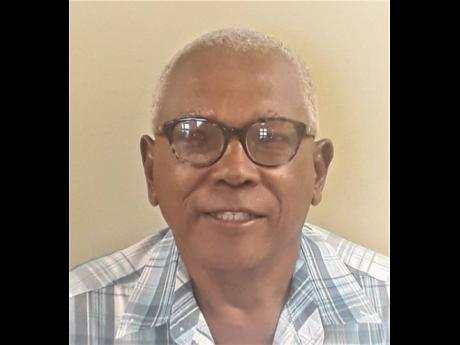Lance Neita | Silence is not golden all the time
A former bauxite industry executive and expatriate Edward (Ed) Coyne, who lived and served in Jamaica from 1975 to 1986 as president and general manager of Kaiser Jamaica Bauxite Company, has shared with me a collection of some of his speeches made to graduation students and to businesspeople on occasions where he had been asked to address the concerns of various business sectors.
He had a practice of going beyond the boundaries of operational responsibility for one of Jamaica’s largest foreign-exchange earners into sharing his own personal perceptions, concerns, vision, and answers to some of the major socio-economic problems that were facing Jamaica during that decade.
It was an explosive period on Jamaica’s political and socially tempestuous front. True, we have gone beyond the violent political extremism of that era. but amazingly, the messages he shared then are still relevant to Jamaica today and make a valuable contribution from the remit of bauxite-industry management to comprehensive strategic management and what he described as the “the will to do and the soul to dare”.
“I was painfully aware,” admits Coyne, “that I was a guest in the country and that ‘silence is golden’ is often touted as the correct credo for all expatriates …. but if you have real feelings for your host country, then you should not hesitate to partner with your host if he would allow you.”
And partner he did as his subject choices covered a wide range of public issues topping the agenda of that decade, including the issues of unemployment levels, currency devaluation, shrinking productivity, industrial relations, social responsibility, and the emotional atmosphere that flared up in the 1976 election and leading into further dispute and violence in the 1980 elections.
The points and suggestions he made were honest, timely, and things that had to be said. He was able to add a different (his own) perspective to problems that were genuinely being confronted by Government, Opposition, and civic and business leaders who recognised the value of this expatriate intervention and, in fact, applauded him unto the platform on Heroes Day 1980 when he was made a Commander of the Order of Distinction (Hon) by the Government of Jamaica.
STANDS OUT
His presentation to the Kiwanis Club of North St Andrew, delivered at the Four Seasons Hotel on January 29, 1981, stands out from the rest.
The occasion was just after the 1980 elections on October 30, which we can recall as perhaps the most divisive in the history of the country and one that scored a record 800 violent deaths attributed to political tribalism.
As he stepped up to the podium, he knew he was standing on very delicate ground as the mood of the country was extremely sensitive to anything that could be linked to partisan politics,
As it turned out, he was given a standing ovation for a speech that reminded his audience that “the things which unite us are stronger than the things which divide us”, and which introduced the Jamaica First message linked to what he called the pursuit of patriotism where Jamaica had a head start – “we already have the world’s most self-healing motto, ‘Out of many one people’”.
And as a further diversion from political tribalism, he suggested that business take on the responsibility of developing alertness to opportunities inherent in unique sets of circumstances that can compound into jobs, incomes, goods, and services for Jamaica.
The Jamaica First slogan became enormously popular, and made a difference, as acknowledged by Governor General Sir Florizel Glasspole, who praised the programme for “its eloquent contribution to national healing”.
The principles of Jamaica First were re-echoed in several speeches and expounded to various audiences as at the Iona School Graduation on July 1, 1984, when he spoke of the connection between social responsibility and business.
He spoke unapologetically about social responsibility and repeated time after time how business can operate only as much as its host community allows it to operate, therefore, business had an obligation to act as responsible corporate citizens.
SOCIAL AND ECONOMIC NEEDS
And repeatedly, his recommendation for business to understand the social and economic needs of the society that supports it, and to reach out to the jobless and those in need of economic and social support.
His earlier speech to the North St Ann Jaycees on November 23, 1978, hit hard as he suggested that the general excuses being made around the country about socio-economic problems being a diversion for employee productivity were an unacceptable crutch for non-performance and urged them to adopt ‘positivism’ as an organisation’s key to redirecting the diverted attention of its members.
To the Island Life Conference on November 7, 1979, he recommended that executives who normally focus on large=scale financial interests may want to take a broader view of the totality of opportunities that permeated through their companies with the goal being to discover whether their uniqueness could allow pin-pointed approaches that could help lighten, to some degree, some of Jamaica’s shortcomings, especially in the area of employment.
The collection of essays by Coyne are tutelage for meeting social problems head on.
The Gleaner’s Corporate Hands page spotlights entities from the private sector that are supporting charitable initiatives in the process of changing lives and communities. Coyne would have instantly recognised and welcomed these initiatives as the outcome of a highly developed social conscience, which he himself practised and preached during his time in Jamaica.
The collection of essays and speeches, Musings from Grandpa, is available on Amazon.
Lance Neita is a public relations professional, author and bauxite industry veteran. Comments to the columns@gleanerjm.com or to lanceneita@hotmail.com.


